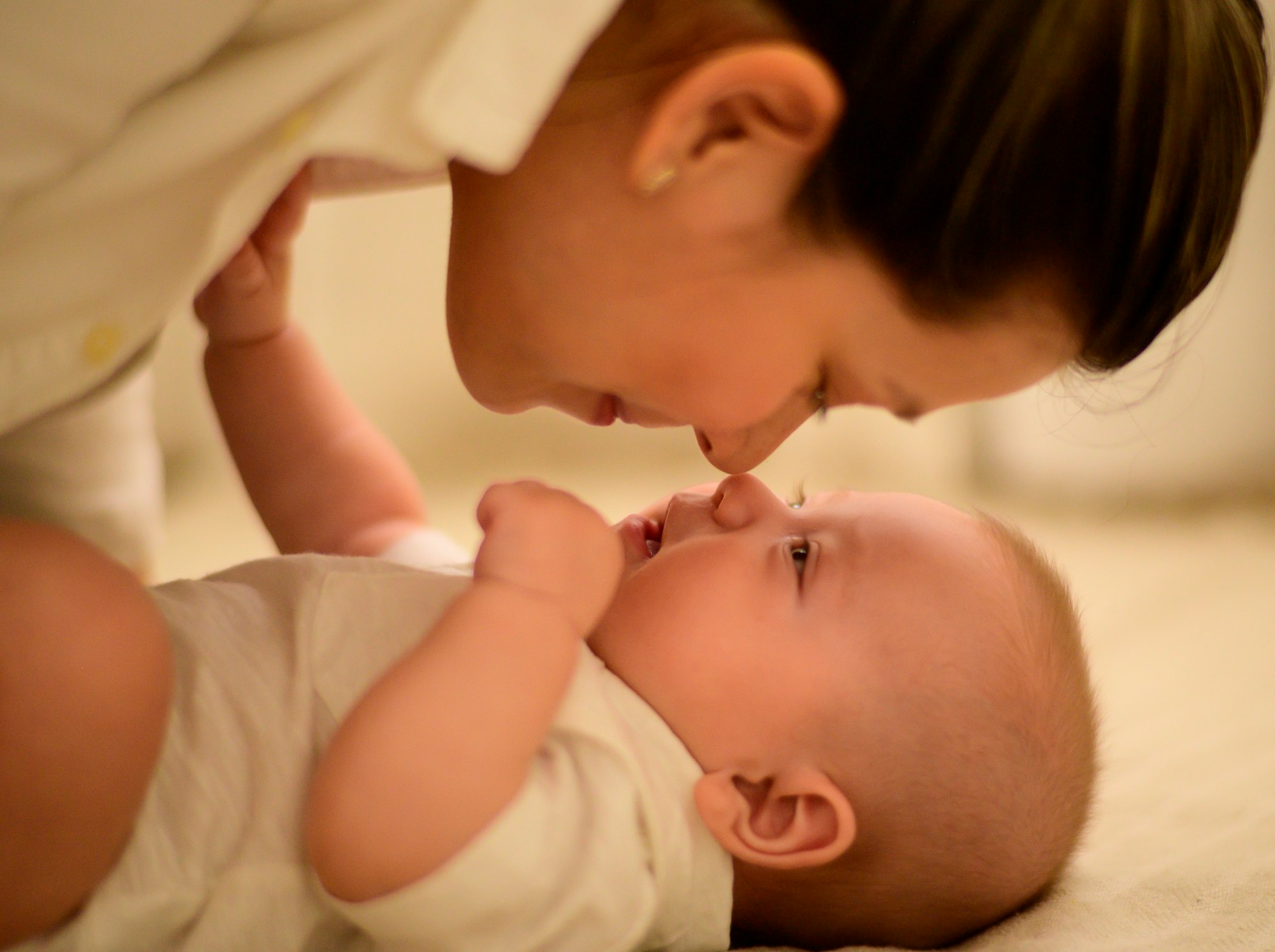Breastfeeding and Menstruation
After giving birth, your body needs some time to adjust and return to its previous state of being. The period in which lactation suppresses your menstruation and fertility is called lactational amenorrhea.

Quick Page Links
- When will your period return?
- How to delay ovulation.
- Bleeding and discharge after birth.
- Your first period.
- What is normal?
- Sour milk? Low supply?
- Uterine cramping and nipple tenderness.
Your Period while Breastfeeding
You might be concerned about many issues surrounding lactation and menstruation, from discharge and missed periods to wondering whether your periods will ever return. After giving birth, your body needs time to adjust and return to its previous state. The period in which lactation suppresses your menstruation and fertility is called lactational amenorrhea. (1)

The Return of Menstruation while Breastfeeding
How long can you go without a period while breastfeeding?
There is no set time to resume menstruation. Every woman is different, but most mothers will resume their monthly cycles just a few months after birth. A mother who is exclusively breastfeeding may benefit from an extended "vacation." ;-) Some mothers enjoy a whole ten or more months of freedom.
Mothers who introduce formula after birth may have a period as soon as ten weeks postpartum.
The average time that mothers start their periods is six months postpartum, but, If you follow the principles of Ecological Breastfeeding, you can delay your menstrual cycle up to 16 months or longer!
The Principles of Ecological Breastfeeding
Delaying Menstruation / How to delay the onset of ovulation
Do not give your baby any liquids or solids other than breast milk.
- Always allow for comfort-feeding.
- Do not use a bottle or a pacifier.
- Co-sleep or have your baby at least an arm's reach away.
- Breastfeed on demand without sticking to any set schedules. The more you breastfeed, the longer your period should stay away. Nurse at least six times per day.
- Always stay close to your baby and avoid being apart. Carrying your baby in a sling or carrier is recommended.
- Breastfeed your baby at night, too. Nurse at least once at night.
You may have lower levels of Progesterone, which could cause you to ovulate sooner, even while sticking to ecological breastfeeding.
Ovulation is highly unlikely before the 10-week mark postpartum. Exclusive breastfeeding promotes the release of the hormone Prolactin, which will keep your body from ovulating. As soon as your baby starts nursing less, skipping feeds, or skipping night feedings, your body will slowly become fertile again. Some mothers, though, have to wean completely before their period returns.
Bleeding and Discharge after Giving Birth
Immediately after birth, you will experience some bleeding called lochia, a combination of blood, mucus, and tissue from the uterus. It may contain blood clots.
Most mothers bleed for up to a week postpartum. During pregnancy, the amount of blood in your body is 50% higher than usual, so your body is prepared for blood loss after birth. The rule of thumb is that if you need to use more than one sanitary pad every four hours, you should contact your doctor. You might notice a pinkish or whitish discharge when the bleeding stops for a few weeks. This bleeding and discharge can last for up to six weeks postpartum.
Is it okay to use tampons immediately after birth?
A mother must avoid wearing tampons during the first six weeks after giving birth. Sanitary pads are best, as they are less likely to cause infection.
Your First Period
The first few periods that a mother experiences usually come back with a bang (more pain and discomfort than you are accustomed to). You might also notice some extra nipple tenderness. If you are concerned about anything, this would be a good time to chat with your doctor or midwife to put your mind at ease.
What's Normal?
What’s a normal period during breastfeeding?
Menstruation during breastfeeding can be very unpredictable. There is a broad range of normal, including the following.
- Mothers who bottle-feed their babies will usually start their periods within two to three months after giving birth.
- Having no period while breastfeeding is normal. Mothers who breastfeed may go without their period for weeks, months, and even years while breastfeeding.
- Some mothers only regain their cycles once they have fully weaned their babies.
- Can your period start and stop while breastfeeding? A mother may have irregular periods while breastfeeding and may skip some months. A missed period while breastfeeding is normal.
- Moms may have premenstrual symptoms without bleeding, indicating that their period will return soon. It's best to take precautions at this stage if you do not want to get pregnant.
- Lactating mothers may notice some spotting—more information about spotting while breastfeeding here.
- A mother may find that her milk supply drops a little just before a period starts due to hormonal fluctuations. (Discussed more in detail below)
- Some babies may drink more or less during a period, as milk might taste a little different. (Discussed more in detail below)
- Mom may experience some uterine cramping during a period. (Discussed more in detail below)
Some mothers may experience a single period before six months postpartum and then do not menstruate again for a couple of months. In this case, there is no way of knowing whether the mother has become fertile (released an egg and could fall pregnant).

Tushbaby Hip Carrier
With its ergonomic design and comfortable waistband, Tushbaby provides optimal support for both you and your baby, allowing for bonding on the go. Say goodbye to shoulder and back pain from traditional carriers, as Tushbaby evenly distributes your baby's weight, relieving strain and promoting better posture.
Will Your Milk Turn Sour?
Will Your Milk Supply Decrease?
Your milk will carry on to provide your baby with the healthiest form of nutrition until your baby decides to wean.
You might notice a reduction in milk supply during "that time of the month." This is due to natural hormonal changes, and your milk supply should return to normal within a few days. During these low-production days, you can comfort-feed more and, if necessary, add a few pumping sessions in-between feedings to increase milk supply. A diet high in lactogenic foods is also recommended.
There is a terrible myth that breast milk turns sour when menstrual cycles return, but this is not true. When there is less milk in the breasts, your breast milk might taste a little salty. Your baby may pull away from the breast because of this. That's okay. Just keep trying; they will eventually take the breast, and your milk supply will return to normal within a few days. Breast massage is a great way to increase milk supply and reduce sodium content in milk.
Keep a lookout for the signs that your baby is getting enough milk.
Coping With Period Pains
Blood calcium levels drop mid-cycle until about day three after your period. This drop in calcium causes a decrease in milk production as well as nipple tenderness and cramping.
Taking a daily dose of calcium (1000 - 1500mg) and magnesium (400 - 750mg), especially during the week before and during your period, will minimize the drop in milk production and prevent nipple tenderness and uterine cramping too. Calcium and magnesium should be taken together, as that much calcium should never be taken alone. They can also be taken for one whole month to regulate menstrual cycles. Evening primrose (1 per day) can be taken to relieve nipple tenderness too.
Getting Pregnant While Breastfeeding
Can you fall pregnant while breastfeeding if your period has returned?
Yes, you should consider yourself fertile once your period has returned.
What about pregnancy before the first sign of ovulation?
If you understand how the menstruation cycle works, you will know that ovulation comes a few days before a period. You may, therefore, become fertile before you see a period.
It is crucial that you look into breastfeeding-safe birth control methods once you have had your first period unless you want to conceive.
Please read our article on fertility and breastfeeding for mothers who want to conceive but do not want to stop breastfeeding.
In Conclusion - Breastfeeding and Menstruation
If anything is bothering you, please get ahold of a la Leche league group in your area. Their services are free.
Many mothers may feel that they want to wean when their periods begin. The longer you breastfeed, the better it is for you and your baby, but this is a personal choice. Please make an informed choice and read up about the benefits of breastfeeding before deciding.
Featured Comments
Help, irregular periods, and breastfeeding!
“Hello, my baby is almost 15 months old, and we are still breastfeeding.
My period has been coming regularly since my daughter turned about 5/6 months old, but they were always late.
Last month I had a normal period, but I haven't started at all this month. I am worried about pregnancy because I don't want another baby this soon.
My husband and I use protection when we "get" to have sex. Is it normal to be this late during breastfeeding?
My daughter still breastfeeds on demand, but she, of course, eats solid foods too. She also nurses throughout the night since she sleeps with me. She nurses most of the night."
Re: Help, irregular periods, and breastfeeding!
by: Tracy
"Hi!
Yes, it is normal during breastfeeding to have irregular periods.
Your hormones are constantly changing, according to your child's time on the breast. The more you breastfeed, the less likely you are to get a period. But this is not the case with everyone. We all have different hormone levels; a mother may have regular periods, even if she skips feeds regularly, or combination feeds."
Irregular Periods.
by Karen LaRose
(Georgetown)
"My last period was November 25. However, around December 18, I began having premenstrual symptoms, but I am still waiting for a period.
In addition to waiting in expectation, I am experiencing, at times, severe cramping in my right side, but this usually lasts for a few minutes and subsides. It's also irregular. Sometimes, a day or two would pass, and no cramps.
I refused to take a home pregnancy test because I kept getting premenstrual symptoms and believed my period would come at any moment. Both before and after my son was born, I experienced irregular periods, but once I began to get cramps, they would usually come shortly.
I am concerned about this. After all, I don't know if it's normal what I am experiencing because I am still breastfeeding my 28-month-old."
Re: Cramps while breastfeeding but no period.
by: Tracy
"Hi Karen, Any irregularity is normal during breastfeeding. The pains that you are experiencing could be hormone related.
I am breastfeeding my 18-month-old and still skip months in which I also experience cramps but no bleeding.
If the pain is severe, it’s best to see your doctor. Those pains can also be an early sign of pregnancy.
Hope this helps."
